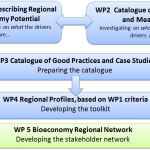BERST dashboard and toolkit for benchmarking and developing regional bioeconomy strategies
The aim of the BERST project was to gain understanding of the possibilities and challenges related to the enhancement of bio-based economies. BERST outcomes are accessible through two catalogues, hosted by VITO and by WUR respectively. The catalogues can be useful for a wide variety of stakeholders, from regional policy makers over local entrepreneurs to profit and non-profit organisations.
The dashboard (catalogue) @ WUR displays a set of indicators helping to assess the future bioeconomy potential of a region. A benchmark option is available to identify a region’s relative position vis-à-vis the country as a whole, applying the following four indicators: Biomass availability and Land use, Demography and Workforce quality, Employment and firms in bioeconomy sectors, and Innovation),
In addition, the dashboard contains:
- Case studies providing in-depth bioeconomy profiles for five RDI2Club regions
- A dynamic reporting option for creating regional bioeconomy profile factsheets
Finally, the dashboard gives access to tools developed under the S3 platform project and the BERST project
The (visualisation tool of the) dashboard was initiated in the BERST project and further developed in the RDI2Club Interreg project.



